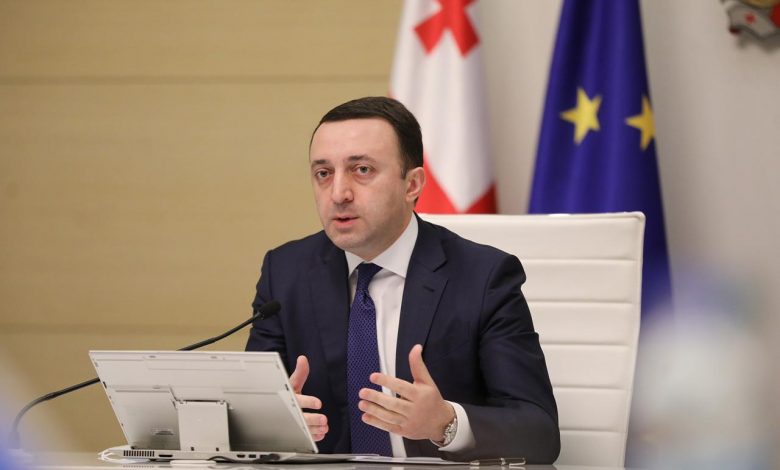
Garibashvili ‘Never Heard’ Europe, U.S. Criticizing UNM-Era Judiciary
Georgian Prime Minister Irakli Garibashvili said today he has “never heard of the U.S. and Europe making critical remarks” towards the judiciary under the United National Movement’s 2003-2012 administration.
PM Garibashvili’s remarks came as the European Union and the U.S. lashed out against the recent appointments in Georgia’s Supreme Court, stating the process contravened EU-brokered April 19 Agreement between Georgian Dream Government and opposition parties.
Noting that “before 2012 the judiciary served as yet another division under prosecutor’s office,” the Georgian Prime Minister claimed the West’s lack of criticism towards UNM-era court system, while disapproving Georgian Dream’s handling of the judiciary, is “of course, unfortunate and not fair.”
- Georgian Dream ‘Astonished’ by Negative Int’l Reactions to Top Court Appointments
- Secretary Blinken ‘Deeply Troubled’ By Top Court Appointments in Georgia
- U.S. Embassy Slams Top Court Appointments
PM Garibashvili also claimed the Georgian judiciary outperforms that of “a great deal of EU member states in terms of independence and transparency.”
“What we have done in eight years, this is like day and night,” stated the Prime Minister, crediting the judicial reforms under the Georgian Dream administration. “We don’t say we are ideal or flawless, but this is a process.”
He also said “misunderstanding” with the United States over the top court appointments will be resolved and “we will answer all of the questions.” “This requires more communication, more relations, more explanations.”
U.S. Criticism of UNM-Era Judiciary
Annual human hights reports by the U.S. Department of State regularly provided critical remarks towards the courts under Georgia’s United National Movement government.
U.S. human rights report for 2012 said “outside influence on the judiciary remained a problem” in Georgia. Citing findings of local non-governmental organizations, the report said that the lack of checks and balances within the judiciary itself “undermined its independence.”Citing the same sources, the report stated that concentration of power within the High Council of Justice (HCoJ) and the Supreme Court Chairman “weakened the independence of judges.”
U.S. report for 2011 said, “shortfalls in the rule of law, such as concerns about ensuring the judiciary’s independent and even-handed application of due process protections” remained among the problems. “Outside influence on the judiciary remained a problem,” it said. “Monitoring groups pointed to the country’s low acquittal rates in criminal cases and low rates of successful appeals as possible indicators of executive branch pressure on the judiciary.”
U.S. report for 2010 said “reports persisted that the executive branch and some senior judges exerted pressure on the judiciary. It cited Public Defender’s report for the second half of 2009, noting that “problems continued within the judicial system including court independence, quality of investigations, parity of the sides, and substantiation of court decisions at various stages of consideration.” “Much of the public viewed the judiciary as one of the country’s most corrupt institutions,” U.S. human rights report for 2010 said.
U.S. report for 2009 said “many NGOs complained that judicial authorities continued to act as a rubber stamp for prosecutors’ decisions and that the executive branch exerted undue influence.” “NGOs also expressed concern that recent judicial appointees lacked the experience and training to act independently. Much of the public viewed the judiciary as the country’s most corrupt institution.”
The report for 2008 said “reports persisted that the executive branch continued to pressure judicial authorities.” According to it, many non-governmental organizations complained that judicial authorities “continued to act as a rubber stamp for prosecutors’ decisions and that the executive branch exerted undue influence.”
This post is also available in: ქართული Русский